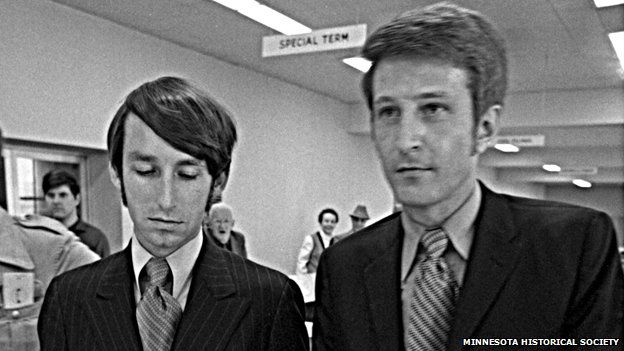Jack Baker and Michael McConnell: Gay Americans who married in 1971
- Published

Last week the US Supreme Court struck down the Defense of Marriage Act, which defined marriage as between a man and a woman. But same-sex marriage has been possible in some states since 2004 - and one gay couple even craftily obtained a marriage licence more than 40 years ago.
"We're gonna win eventually, not this time but maybe the next time around."
In 1973, gay rights activist Jack Baker told an American talk show it was just a matter of time before same-sex marriage would be legalised.
He was appearing on the influential David Susskind Show, broadcast nationwide, after he and his partner, Michael McConnell, had managed to secure a marriage licence by subterfuge.
For Baker, marriage was a civil rights issue.
"It goes to the core of discrimination, you cannot let non-gay people treat you differently… you have to say 'I pay taxes to support this government and it is going to recognise me as an equal citizen or by God I'm going to disrupt that government.'"
Jack Baker on US television in 1973
The prevailing image of homosexuality in the early 1970s was a caricature - flamboyant men in gay bars, and a lifestyle of wild promiscuity.
Going public about your sexual orientation could cost you your home, your job and your family.
Baker and McConnell didn't fit the stereotype. Both in their late 20s - clean cut and with short, neat hair - Baker was a law student and McConnell a librarian. They'd been together for four years when they first applied for a marriage licence in 1970.
This was rejected - on the grounds that they were both men. But the couple decided to fight. They appealed, and kept on appealing until the case reached the US Supreme Court. It was the first time the court had been asked to rule on gay marriage - but it refused to hear the case "for want of a substantial federal question".
Undeterred, the couple tried again. This time they tried a different tack - Baker changed his name to the gender-neutral "Pat Lyn".
A very simple manoeuvre, but it did the trick. The licence was issued and they began to plan a wedding. They asked a Methodist minister to perform the ceremony and went through weeks of pre-marital counselling like any heterosexual couple preparing for a Methodist wedding.
But with 24 hours to go, the minister changed his mind.
They needed another minister to step forward, says Pastor Roger Lynn, who worked alongside the couple at a drop-in centre offering support and counselling to gay people in Minneapolis.
"It wasn't just a marriage… it was a social event in the gay community," says Lynn. The couple were planning to film the wedding, in order to get the word out to the national media.
Lynn jumped at the chance to conduct the ceremony. At the time, his church had no rules against marrying people of the same sex, he says.
"The Methodist church has always taken a strong stand on social issues… I expected that the progressive side of the church would support me."
The ceremony took place in an old Victorian home near a lake in Minneapolis.
"There was a cake and rather than a bride and groom on the top, there were two grooms," Lynn says.
He remembers pronouncing the couple "husband and husband".
He says it was an emotional moment, "particularly when they kissed".
Despite his work at the drop-in centre he'd never seen two men kiss - and he says he had a "visceral reaction".
"It was frightening," he says. "It forced me to come to terms with my own homophobia."
At the end of the ceremony, when many of the congregation came up to the pastor in tears, he says he knew he'd done the right thing.
"It was very clear that these two people were in love with each other, and they were a good balance," he says.
After conducting Baker and McConnell's wedding ceremony, Lynn found his own marriage was in trouble. His wife wasn't happy about what he'd done and was nervous about the attention it would bring. The following Sunday they attended church and the preacher leading the service vilified Lynn for performing the marriage.
Lynn was steadfast. "I thought it was funny," he says. "I knew some in the congregation supported me and I felt a little smug."
But soon afterwards he began to get hate mail from across the country. His notoriety was such that one letter reached him addressed simply to "gay hippy minister, Minneapolis".
He was fired from his job, but soon reinstated on appeal.
His marriage also ended, though not for this reason alone, he says.
For years afterwards fellow ministers tried to get him to change his mind about what he'd done. But despite all these problems, Lynn - now retired and living in Minnesota - says he's never regretted his actions.
"It defined who I am and if I had the chance to do it again, I'd do it again," he says.
Jack Baker and Mike McConnell received many letters of support from across the world - from Brazil to India.
One postcard sent from Barbados read simply: "Congratulations on your courageous step! Hope your dreams come true and that life together will be as beautiful and happy as can be."
The couple still live together in Minneapolis. They consider themselves legally married as their licence has never been revoked.
They don't give interviews to the media now, but speaking on the David Susskind show in 1973, Baker described their attitude to same-sex marriage.
"Gay couples will come into the relationship as two equal human beings and so you don't arbitrarily assume that because you have certain genitals you'll do a certain thing… heterosexuals should learn that one."
Roger Lynn was interviewed for the BBC World Service programme Witness